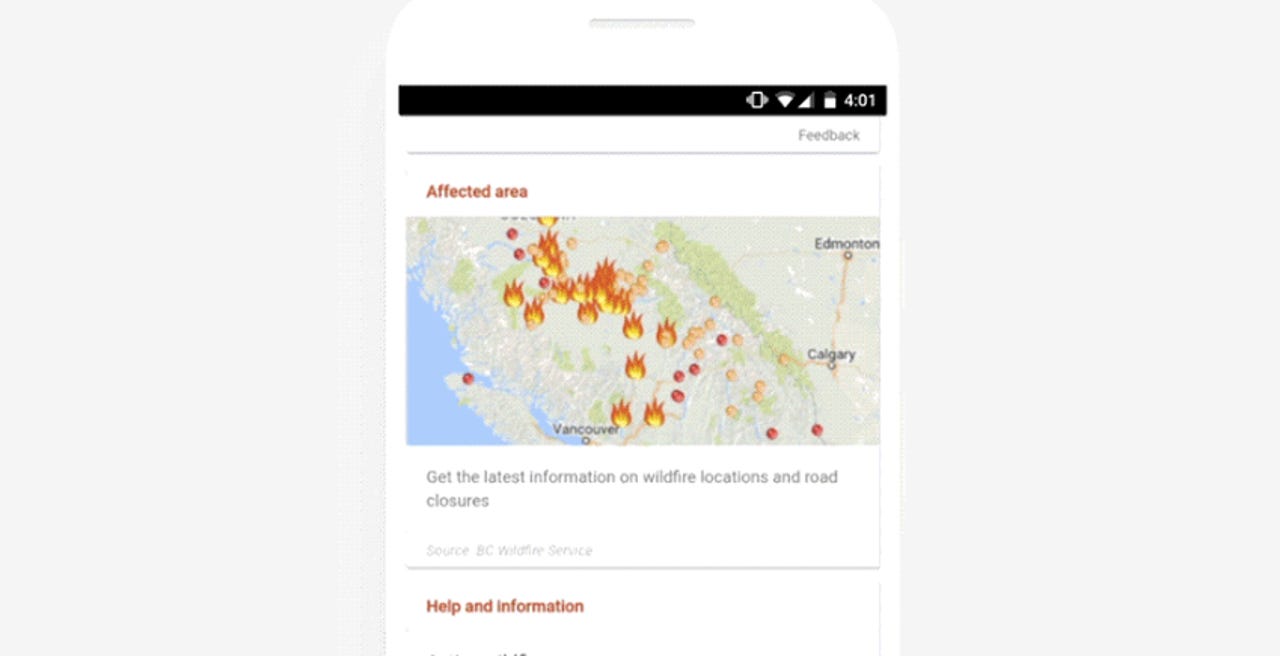Google launches SOS Alerts in Search and Maps for emergency updates


Google's SOS Alert.
Google has launched a new feature called SOS alerts in Maps and Search, which shows emergency information during "natural, manmade and humanitarian disasters".
Similar to Facebook's Safety Check, the new feature aims to help Search and Maps users make decisions during a crisis, although instead of friends, the Google alerts are based on "authoritative" content from the web, social media, and Google products, such as Google News, Google Maps, and Waze.
The updates themselves can include emergency phone numbers and websites, maps, useful translations, and donation details. The alerts are available in the main language of the affected area and in English.
Featured
In Search, an SOS Alert will appear at the top of results if the user searches a location or incident, prominently displaying news, maps, and if available, updates from local authorities, and translations.
The feature in mobile Maps offers live updates about the area on the map, and links and contact details for emergency resources, in a card. It will also display an icon on the map that can be tapped for more information. The map includes real time information about road closures, traffic and transit updates.
Google may also deliver an SOS Alert in the form of a notification if the user has installed the latest version of the Google mobile app and location is enabled. It could also display a banner if the user is near a crisis.
SOS alerts also allows those outside an affected area to see alert information if they type a relevant search, such as the name of the event of the location.
Google notes in a support page that it can't guarantee users will see an alert for every major crisis, although it will be trying to an increasing number more over time. It doesn't specify whether this means certain types of crises or different regions of the world, but said it will cover both natural or human-caused incidents.
Factors that determine whether it will show an alert include the internet connectivity in the affected area, information from local authorities, and what's actually happening on the ground.
Google includes SOS Alerts among its numerous crisis response features, some of which are more fully developed for the US than other markets due to information-sharing agreements with partners.
SOS Alerts complements Google's Public Alerts service, which aims to help local authorities issue emergency messages related to weather, public safety, and earthquakes. It publishes content from partners, such as weather services and fire brigades in North America, parts of Asia, Australia and New Zealand, but is yet to establish partnerships in Europe.
According to the BBC, SOS Alerts will cover events in Europe but they will be less detailed until Google strikes partnerships with local information sources.
Read more on Google
- Google asks US court to block full enforcement of Canadian de-indexing order
- Alphabet beats Q2 targets even as profit slumps on $2.7bn EU fine
- Google releases final Android O developer preview
- Google 'right to be forgotten' case goes to top EU court
- Google wants you to stop using its SMS two-factor sign-in
- Google CEO: 11 phones will start Daydreaming before 2018 (CNET)
- Google Home: The smart person's guide (TechRepublic)